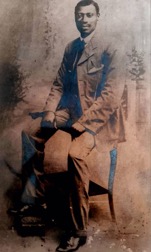
The disadvantage is glaring that in places in Africa such as The Gambia where tradition had been largely oral, great patches of uncertainty and inaccuracy bedevil the stories handed down. The advantage of education had given many Krio personages since the founding of Bathurst to have committed ideas and opinions to paper. We able today to red files containing letters and petitions our forebears sent to London to champion the cause of freedom, respect and independence for the Gambia Colony such as the Memorialist did in the early 1800s.
Apart from the writers in newspapers that grew in the beginning of the 1900s we have individuals who have printed their thoughts in books. Writing in September 1945, a Gambian Krio emigre to Sierra Leone, Dixon Baker, who later become the famous Rev Dixon Baker of Signal Hill Road, Wilberforce, Freetown, Sierra Leone, left posterity with his humour and art in a drama booklet titled in Krio, Ef Syrian Go, Plenty Go Sorry—translated to English as ‘If the Syrians go away, many will be sorry.’ It portrayed life’s economic and social intricacies in Sierra Leone, using characters with hilarious names such as Sally Tamatis (a trader in tomatoes), Mary Shirting (a cloth seller), and Fatoumatta Sonji Abdulai (a fishmonger.) It was a folkloric hit in the immediate post-war years of the late 1940s in Freetown as well as in Bathurst, The Gambia.
In 1953, society leader Tom B. King gathered his friends and together published essays in a booklet form. The maiden issue stated the aim to survey of Our Contemporary Society through candid arguments on governance, social attitude of religions, and their relationship to the standard of development that will put our present specialists to shame.
Instructions: My Last Will and Testament
A former policeman and clerk, Charles Claudius Johnson, also took pains in the twilight of his years in Freetown, Sierra Leone, to write down his thoughts to his dear daughter in Bathurst, River Gambia, stating clearly that, “The following are my instructions to be strictly followed to the letter upon my death.”
Charles Claudius Johnson, born August 1, 1866, came from Freetown to Bathurst, Gambia, on January 15, 1885. He was a priest, seconded to The Gambia Colony in The Gambia Police Force. He then served for 34 meritorious years in various departments in Bathurst until his retirement in April 1919, as chief clerk at the Cashier’s Office at the Government Treasury.
Commonly known in his heyday as ‘C.C. Johnson’, he married Catherine Roberts, first-born of two girls and two boys born to immigrants Thomas Grey Roberts (from Nigeria) and Jorjo Jow of Ndarr (St Louis, Senegal), the capital of French possessions in West Africa, and sired two daughters, Naomi Johnson, and Hannah Elizabeth Johnson.
At the end of his sojourn of 34 years, he retired back to his home in Freetown. In the twilight of his years, he wrote things down in his own hand to his most trusted confidante, his daughter Hannah, who he fondly addressed as Han—My own dear Han—in his letters to 46 Allen Street, Bathurst, River Gambia. He lived into his eighties and left this study of Krio anthropology precious insights into the mind of a disciplined, compassionate, and orderly mentality. Even in declining health at his residence at 55, Westmorland Street, Freetown, Sierra Leone, the old man addressed letters regularly to Han in touching words of testimony and instruction. Only by way of illustration, the following was extracted from three letters written in September, 1937, on November 17, 1941, and on November 10, 1948:
“I am trying as best as lieth in me to set my house in order before I go hence. I don’t want any unpleasantness after I am gone. So I am sending you this as…instruction for you to follow:
- I have appointed you and two trustees as joint executors of my last will… I shall owe no one anything at my death.
- See that all that are benefitted under my will are paid every penny, and other personal effects handed to them.
- The estate must be closed within three months from the date of my death.
- Exercise the greatest of patience and see that everything is done decently and in order.
- My last will (dated 11th June 1941) is deposited in the Registration Office and must be read after my funeral. Hannah should apply for it; she is to have the first say in everything, and to see that everyone in the will is given his or her share.
- I must be laid out in ‘sleeping suit’ in the parlour.
- A photo is to be taken when I am laid out for absent family and friends to see...
- I want a plain black-lined coffin with only the breastplate and handles with my name and date of death on it with the words ‘His works follow him. R.I.P.
- No need for any cookery of 3 days and 7 days and, if possible, no wearing of black; but white dress and black hats.
- Secure a place for my burial either at Ascension Town or King Tom Cemetery near the entrance gate if possible.
“I have a relative at present that I can count upon if I am seriously ill and could do nothing of myself. So if a telegram is sent to you to ‘Come at once’, make all efforts and come without delay, otherwise if I die and you are not there, my personal effects will be interfered with…In the event of a telegram sent to you reporting my serious illness, you must make efforts to come as early as possible… One could not tell when the messenger will come, but I am asking you to spare me a little and to allow you to be at my bedside at the last hour… As you know, we are all strangers, and the time will come when we must return home. God has done great things for me and my family.
“I tried to scribble you these few lines, take it for what it is worth. I am nothing but skin and bones…I can’t eat; I eat only to keep life. I thank you for what you … sent … for me. May He continue to guide and keep you. I am begging Him that I see you in person before I go. I am feeling like going home daily… May He bless, direct, and keep you from harm, (Han), and that is the dying wish of your dear Papa.”
PS: Anything you may wish to know beforehand, write and ask; it does not follow that I am calling for death. He says, “Be ye also ready.”
Your dear Father,
Charles C. Johnson.
(From family memorabilia, courtesy of Pamela Femi Collier-Njai, Atlantic Blvd., Fajara, The Gambia. Excerpted from The Ktio People of The Gambia by Nana Grey-Johnson.)





